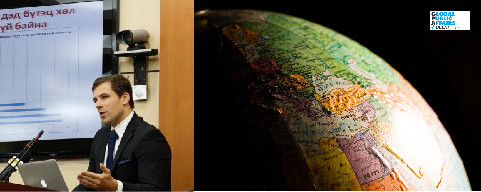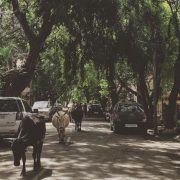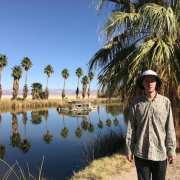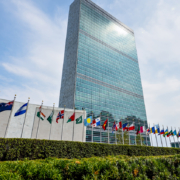An Alumni Q&A with Urban Advocate Dave Mason ’11
Dave Mason received his doctorate in urban and regional planning from UCLA in 2011, and has over nine years of experience in research and practice related to land and housing, urban poverty and slums and urban service delivery. He currently works as an Urban Specialist with the World Bank where his work covers two areas. First, he conducts applied research on urban development trends and patterns at the city and country level in multiple regions. Second, he has recently developed and implemented lending and technical assistance operations work related to improving urban service delivery, disaster risk management, affordable housing, spatial planning, and urban land administration in Mongolia, Mexico, and Pakistan.
The following interview is an edited Q & A transcript with Luskin alumnus Dave Mason PHD UP ’11
Why did you choose to study at UCLA?
The department had a long history and deep contributions to the field of planning. The faculty is also deeply engaged with students and active in research, so I knew I would have plenty to keep me busy and build my own interests. Los Angeles is also a fascinating city, in terms of the changing built environment, and cultural and social dynamics of the populations that live there.
Did UCLA live up to your expectations?
Of course!
What are some of your fondest memories from your time at UCLA? Did you have any favorite academics?
I made a lot of great friends both within the department and through my fieldwork in Nicaragua. I took away a great deal from seminar discussions with my cohort, countless cups of coffee chatting at Luvalle – the people really made the experience stand out for me. I recall reading innumerable books, articles and student papers on daily #2 Sunset bus trips to and from campus from where I lived in Los Feliz, a trip which also connects some of the poorest and richest neighborhoods in the city; quite an interesting bus ride. I managed to train for a marathon while writing up my dissertation. This not only helped with stress relief and with organizing my thoughts for writing, but I found that exploring different parts LA for hours at the pedestrian scale was endlessly absorbing.
I’ve admired John Friedmann’s writing style along with the breadth of contributions he has made to planning over so many decades. Overall though, I appreciate scholars who are not only established in a specific area of study, but who can approach and engage research questions and topics in areas that have little or tangential overlap to their research interests – even if its just through thoughtful questions or a careful reading of a draft paper. Such a proficiency in the practice of research – along with persistent curiosity – both improves the learning environment for graduate students and discourages ‘siloing’ of research within our discipline.
What led you to pursue a career in urban planning, and how has your work/interests evolved since your time at Luskin?
Planning is an interdisciplinary and applied field. Most people have some opinion about the place they live, how it has changed and what it should be like in the future. Also, the effects of change in cities are very tangible: people see it both in terms of everyday activity and routines, (travel, perceptions of safety, sense of community, the uses and aesthetics of the built environment etc) but also over the course of years and decades spent in the same place (demographic and economic changes for example). How these changes happen and what they mean for making better cities is what drew me to planning.
At Luskin, a lot of what I was researching was related to theories ‘of’ planning – what are the contexts and conditions for certain types of collective action that underpin planning as an undertaking. Much of what I do now draws from theories ‘within’ planning – focusing much more on ‘what’ is planned and what this means for questions of economic efficiency and social inclusion in cities. I’m still learning.
Students will be interested to know about your current work around land and housing, urban poverty and slums and urban service delivery around the world. What is the nature of your work? What do you enjoy about it? What have been some of the challenges and how did you overcome them?
With the World Bank, most of my work consists of providing advice for governments in developing countries on these issues and preparing loan projects to address them. I find a lot of my work places me as a kind of ‘urban advocate’ in a very basic sense. Many governments are either ambivalent or hostile towards urbanization, or they see it as a process that cannot be undone or managed well – even at the margin. So, in some sense a lot of the work is introducing some of the basic concepts of planning and urban economics and what they mean for improving different aspects of cities; the power of urban agglomerations for competitive labor markets, economies of scale for service provision and so forth.
A lot of what I do is take different lenses – say “urban land” – and try to build the case to a mayor or a minister (usually through some type of original study or series of workshops) by demonstrating that there may be clear and persistent problems in their cities that are related to this issue (in terms of housing affordability, natural hazard risks, lack of access to water or schools, congestion, overlooked sources of public revenue, etc) and it is worthy of their attention. Then we can look at how, through an investment loan or technical assistance project provided by the bank, such problems can be addressed. So for ‘urban land’ this can include things like changing an existing demand-side housing subsidy program so that the subsidy amounts are linked to the actual location of urban housing units in order to encourage infill over low density peripheral development, or revising zoning and land use regulations to allow more flexibility for different kinds and intensities of land uses.
The aim of Global Public Affairs @ UCLA Luskin, is to prepare students intellectually and professionally to navigate the rapidly-changing, increasingly interconnected global world we live in. How do you see your work as relating to or benefiting from a global perspective?
In my work, there is often a tendency to want to take and transplant things and ideas that “work” in one place to other places with hope of achieving the same results. While as a young professional, it is good to have such a broad, global knowledge of these sorts of cases and examples in your area of specialization, I would have to caution that it is seldom as easy to do this as we like to think. Local knowledge, history and political economy still matter a great deal. As people working in places where we are the outsiders, you often have limited knowledge of or control over many variables. Things can move slowly, patience is important and rapport and respect with your counterparts are crucial.
Similarly, what advice do you have for students who seek to become “global citizens”?
Always be ready to listen in order to ask good questions. Realize the limits of what you don’t know. Prepare to be uncomfortable and to not have the all the answers in every situation.










